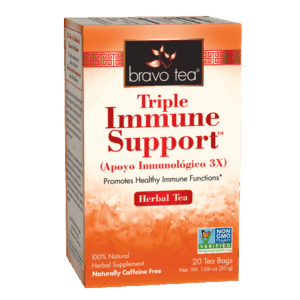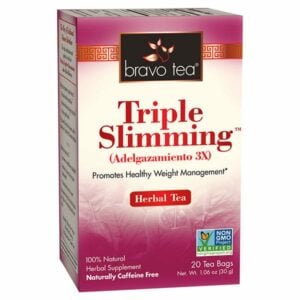Your cart is currently empty!

When you think of China, do images of buzzing cities, the Great Wall, vast rice fields, silk shops, and dumplings fill your mind?
These are some of the most common things we associate with China. But what about tea? Tea is one of the most important aspects of Chinese culture, trade, and of course – medicine!
Let’s learn more about the history of tea in China and how you can sip your way to better health with Chinese teas.
The History of Tea in China
Tea is an everyday staple in homes around the world. In fact, it is estimated that over 159 million Americans and over 2 billion people worldwide drink tea each day!
While the British popularized tea among Westerners, tea has a rich history dating back thousands of years in China, Japan, and India. Let’s take a look at how tea got its start in China and in Chinese medicine.
The Origin of Chinese Tea
Tea has been cultivated in China for a long time – over 5000 years to be exact.
The origins are still unknown, but Chinese medicine lore has it that Emporer Shen Nong was the first to try tea around 2737 BC. Shen Nong was known as the “Divine Farmer” and taste-tested all the local herbs to determine their properties. Legend has it that a camellia blossom fell into Shen Nong’s cup of hot water. When he drank it, he was delighted and the practice of tea drinking took off after that.
Other sources disagree, saying that the first true reference to tea occurred in an ancient Chinese dictionary from 350 BC.
Chinese Tea as Medicine
While sipping on a warm (or cold) cup of tea has become one of our favorite pastimes, tea was originally used as a medicine.
Tea was originally most popular as a digestive aid. People drank herbal tea with or after their meals to ensure good digestion and avoid issues like burping, bloating, and constipation. Later, tea was used to help improve energy, stress, stamina, immunity, and much more.
The Culture of Tea
Something as delicious and versatile as tea didn’t stay as just medicine for long. In the 8th century, a book called The Classic of Tea by Yu Lu was published, making tea drinking an activity – and even an art – in and of itself.
From here, rituals and rules about how to brew, steep, and serve tea developed as did the famous tea houses and ceremonies. As it grew more popular, tea became a noteworthy gift and even the subject of poetry!
For All the Tea in China
Tea is a huge topic with as many experts and aficionados as coffee or cigars. Get your tea knowledge up to snuff with this simple tea breakdown:
Traditional Teas
These teas are the classic tea made from the Camellia sinensis bush.
White Tea
Made from young tea leaves and gives a light flavor. It is believed that white tea has the best health properties.
Green Tea
Green tea leaves are not fermented, which maintains their green color and brightness.
Black Tea
Black tea is the most traditional type of tea and what you would be most likely to mix with milk and sugar. It is made from mature, fermented leaves.
Oolong Tea
Oolong is only partially fermented, which gives a unique blend of both black and green flavor profiles.
Herbal Tea
Herbal teas are not made from the Camellia sinensis bush and are therefore not true “tea,” but they are steeped and drunk in a similar fashion.
Lemon Ginger Tea
Lemon ginger tea is made with dried lemon peel and ginger root to aid digestion and perk up your mood.
Peppermint Tea
Peppermint tea is a great tea for digestive trouble, headaches, and general stress relief.
Chamomile Tea
Made from yellow chamomile flowers, it is best known to relieve stress and promote sleep.
Bravo Teas: Our Choice in High-Quality Chinese Herbal Teas
Tea is such a simple way to add pleasure to your life. You’ll reap even more benefits when you sip a cup of powerful herbal medicinal tea.
At Best Chinese Medicines, we carry a wide range of Bravo Teas to help make living healthy as simple as taking a daily tea break. Here are a few of our favorites:
Triple Slimming Tea
Staying hydrated and stimulating your metabolism with herbs are two secret tricks that can help you lose weight faster – and keep it off. Dieter’s Slimming Tea helps you do both with a potent blend of weight loss herbs and a beautiful jasmine flavor you could sip all day.
-
 Sleep And Renew Tea – by Bravo Tea
Starting at $6.99
Add to CartSelect options
This product has multiple variants. The options may be chosen on the product page
Sleep And Renew Tea – by Bravo Tea
Starting at $6.99
Add to CartSelect options
This product has multiple variants. The options may be chosen on the product page
Sleep & Renew Tea
When you’re wired at night and can’t sleep, Bravo Tea’s Sleep and Renew will get you back to bed quickly. This tea uses schizandra berry, a famous herb to calm the nerves, and other naturally caffeine-free ingredients.
-
 Triple Immune Support – by Bravo Tea
Starting at $6.99
Add to CartSelect options
This product has multiple variants. The options may be chosen on the product page
Triple Immune Support – by Bravo Tea
Starting at $6.99
Add to CartSelect options
This product has multiple variants. The options may be chosen on the product page
Triple Immune Support
A cup of immune-boosting tea a day keeps the doctor away! Bravo Tea’s Daily Immunity is a powerful blend of immunity herbs that you can drink daily to keep your immune system in tip-top shape.
Shop our Full Collection of Bravo Teas
Drink Tea for Daily Health
“Where there’s tea there’s hope.” – Arthur Wing Pinero
Tea is one of life’s greatest pleasures, and one of medicine’s simplest remedies! With Bravo Teas, you can turn a common daily habit into a self-care ritual that pushes you closer to your most important health goals.
Find the best tea for you in our full collection of Bravo Teas!
Share This
Table of Contents
- The History of Tea in China
- For All the Tea in China
- Bravo Teas: Our Choice in High-Quality Chinese Herbal Teas
- Drink Tea for Daily Health
About the Author
Blog Categories
- Adaptogen Articles (8)
- Brain Health Articles (9)
- Chinese Medicine Basics Articles (13)
- Chinese Medicine for Pain Articles (15)
- Chinese Medicine for Pets Articles (3)
- Chinese Medicine for Skin Conditions Articles (6)
- Chinese Medicine Formula Articles (6)
- Chinese Medicine Sleep Articles (4)
- Conditions & Concerns Articles (24)
- Digestive Issues (5)
- Eating for the Seasons (2)
- Health & Lifestyle Articles (17)
- Heart Health Articles (4)
- In the News (1)
- Medicinal Mushrooms Articles (7)
- Men's Health Articles (8)
- Scholarships (5)
- Uncategorized Articles (9)
- Weight Loss, Diet & Obesity Articles (5)
- Women's Health Articles (10)
Articles Related To The History of Tea in China
-
Are you wondering which form of a Chinese herbal formula is right for you? Let’s explore the various types of Chinese herbal medicine to help you decide. Those new to Chinese herbal medicine often ask why there are so many different types of preparations, like pills, tablets, tinctures, and decoctions. What’s the difference? And which…
-
How to Effectively Use Teapills for Your Health Teapills, a staple in traditional Chinese medicine (TCM), offer a simple way to incorporate powerful herbal remedies into your wellness routine. These tiny, round, herbal capsules are pre-prepared, easy to take, and packed with centuries-old wisdom. If you’re looking to benefit from the healing power of TCM,…
-
How Chinese Medicine treats dysfunction, disease, health and wellbeing is complementary to Western Medicine Even at a glance, Chinese Medicine is quite different from Western Medicine. Earthy herbs are favored over laboratory compounds, mind and body are considered one, and diet and lifestyle take center stage. Chinese Medicine is an ancient system developed thousands of…
-
What do we mean by the Spleen: According to Traditional Chinese Medicine theory, the energetic organ system responsible for what we in modern times call “digestion” is the Spleen. This is not to be confused with the Western medical definition of the spleen as the organ that, among other things, makes antibodies, removes old red…
-
In Traditional Chinese Medicine, each season is more than just a change in weather; it’s an opportunity to align our bodies and live in tune with nature. With late summer – the “fifth season” of TCM – upon us, now is the perfect time to rethink what we put on our plates and eat in…


 Triple Slimming Tea – by Bravo Tea
Triple Slimming Tea – by Bravo Tea